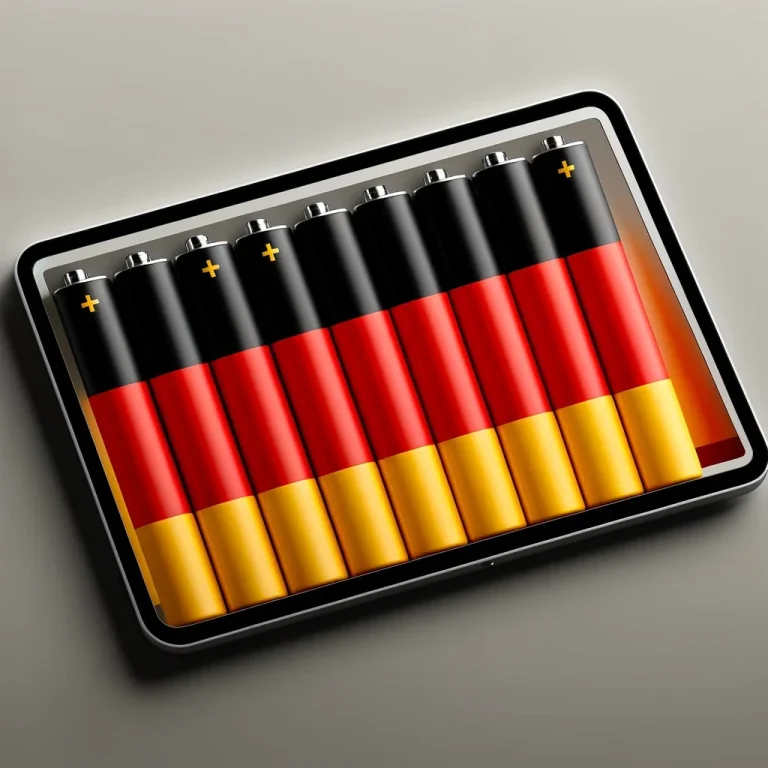Sprache: DE
17. May 2024
New Batterierecht-Durchführungsgesetz (BattDG) in Germany
What does this mean for manufacturers and consumers?

Service for our customers
The Federal Ministry for the Environment (BMUV) recently presented a draft law to adapt to the EU Battery Regulation (EU-BattVO). This regulation aims to make the handling of batteries more sustainable along the entire value chain. The new "Batterierecht-Durchführungsgesetz" (BattDG), which is due to be passed in August 2024, will impose additional requirements on manufacturers and consumers. In this article, we take a look at the most important points of the new law and what they mean for extended producer responsibility.
Stay informed with us,
give us a call: +49 2443 994912-0
or
The EU Battery Regulation came into force on August 17, 2023 and replaced the previous EU Battery Directive on February 18, 2024. The aim of the regulation is to create a uniform legal framework for the sustainable use of batteries in Europe. It includes regulations on the restriction of substances hazardous to health and the environment, design, labeling, conformity and due diligence obligations for batteries as well as the collection and treatment of waste batteries.
The BattDG is to replace the previous Batteries Act (BattG) on August 18, 2025.
The draft law builds on the existing structures of the BattG and develops them further. A key point is the expansion of the proven structures for the disposal of waste portable batteries to include other types of batteries, such as batteries from e-bikes and e-scooters as well as waste starter, industrial and electric vehicle batteries.
The EU Battery Regulation: An overview
The BattDG: adaptations and extensions
Extended Producer Responsibility (EPR)
A central topic of the new law is the extended producer responsibility. In future, manufacturers will not only be responsible for the disposal of waste portable batteries, but also for batteries from light vehicles and other types of batteries. This means
- Expansion of the return options: In future, consumers will be able to return not only waste portable batteries, but also batteries from e-bikes and e-scooters to municipal recycling centers.
- Increase in collection points: The expanded return options will increase the number of collection points, making it easier for consumers to return them.
- Collection targets: The current national collection target of 50% for waste portable batteries remains in place. An EU-wide collection target of 63% will apply from 2027.
- Fire protection: Batteries containing lithium, which pose a fire hazard, must be disposed of properly. Extending the established structures to these types of batteries is therefore also key to fire safety.
Responsibilities and powers
The draft law also defines responsibilities and powers for the new tasks arising from the EU BattVO. These include:
- Management of spent batteries: This follows on from the previous requirements of the BattG.
- Conformity of batteries: The countries must set up a competent authority.
- Due diligence obligations in the supply chain: The German Monitoring Body for EU Due Diligence Obligations in Raw Material Supply Chains (DEKSOR) will take over the monitoring tasks.
Conclusion
The BattDG brings far-reaching changes and extended responsibilities for manufacturers. The expansion of return options and collection points is intended to strengthen the circular economy and make the disposal of used batteries safer and more transparent. For consumers, this means greater convenience when returning old batteries and an improved disposal infrastructure. The coming years will show how these new regulations will affect practice and to what extent the set collection targets will be achieved.
Stay informed and make sure that your old batteries are disposed of correctly,
give us a call: +49 2443 994912-0
or
Wir benötigen Ihre Zustimmung zum Laden der Übersetzungen
Wir nutzen einen Drittanbieter-Service, um den Inhalt der Website zu übersetzen, der möglicherweise Daten über Ihre Aktivitäten sammelt. Bitte überprüfen Sie die Details in der Datenschutzerklärung und akzeptieren Sie den Dienst, um die Übersetzungen zu sehen.
